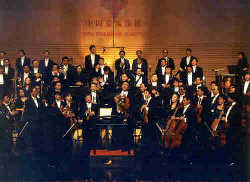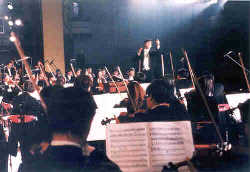 The China Philharmonic Orchestra (CPO) was established on the basis of the China Broadcasting Symphonic Orchestra. It is now directly under the State Administration of Radio, Film and Television with Yu Long as its chief conductor and chief arts inspector.
The China Philharmonic Orchestra (CPO) was established on the basis of the China Broadcasting Symphonic Orchestra. It is now directly under the State Administration of Radio, Film and Television with Yu Long as its chief conductor and chief arts inspector.
The China Broadcasting Symphony Orchestra was among the first symphony orchestras established after the founding of the People's Republic of China (PRC) in 1949 and has contributed greatly to China's musical development. Officially founded on May 25, 2000, the orchestra has set its objective of becoming "first rate at home, among the best in Asia, and well-known in the world."
On December 16, 2000, the CPO, conducted by Yu Long, held a grand debut in Beijing with great success. In the first half-year of its establishment, the orchestra presented a large number of concerts featuring masterpieces of Chinese and foreign composers.
In the six months after its birth, the CPO held many concerts, staging a large number of Chinese and foreign symphony masterpieces. In line with standard world practice, the CPO finds its players by engaging outstanding musicians from China and other parts of the world. The CPO's unswerving commitment to quality means that it now ranks among the largest and most promising orchestras in Asia.
The orchestra's seasons are planned to establish extensive collaborative relationships with world-famous conductors and soloists. The orchestra's first season ran from September 2001 to July 2002, offering a rich repertoire of works from different periods and styles. Among the highlights was the world premiere of the Philip Glass Concerto for Cello and Orchestra, and performances of Gustav Mahler's Das lied von der Erde, Hector Berlioz's La Damnation de Foust, and Du Mingxin's Symphonic Peking Opera Female Generals from Yang Family, composed especially for the CPO. Among its 2002-2003 season's highlights are the historic PRC premiere of one of the largest works in orchestra literature -- Mahler's "Symphony No.8" and "Symphony of a Thousand," featuring musicians under the inspiring lead of maestro Yu Long, and "the Immortal Beethoven" series with all of the composer's symphonies and concertos. The 2003-2004 season will see the completion of the orchestra's Mahler symphony cycle that stretches throughout the three seasons. In 2004, the CPO will honor the anniversary of Dvorak's death with performances of his Stabat Mater and major orchestra works.
The CPO attracted attention from overseas soon after its first performance. In September 2001, it toured Taipei, Hsinchu, Raichung and Kaaohsiung, the major cities in Taiwan. At the invitation of the Casals Festival, the CPO visited San Juan and Puerto Rico in June 2002. The two performances, conducted respectively by Long Yu and Krzysztof Penderecki, its principal guest conductor, proved to be a great success and a major event at the festival. Equally impressive were the two concerts that the CPO staged in Cupatina and Los Angeles, United States, following its Puerto Rico tour. In September 2002, the CPO made a successful tour of Japan and Korea. In 2003, it will embark on its first European tour, appearing at Palais Garnier, Paris, France, the National Opera in Warsaw, Poland and the Grober Musikvereinssaal in Vienna.
The CPO has collaborated with many renowned musicians, including Mikhail Pletnev, Anatal Ugorski, Gerhad Oppitz, Yundi li, Lang Lang, Itzhak Perlman, Kyako Takezawa, Cho-Liang Lin, Xue Wei, Gehord Poulet, Jian Wang, Julian Lloyd Webber, Placido Domingo, Cheryl Studer, Changyong Liao, Sergiu Comissiona, Okko Kamu, Klaus Weise, Muhai Tang, Lan Shui and En Shao.
The orchestra has also recorded two compact discs for Deutsche Grammophon under Yu Long's direction, one of Wanger's "Tannhauser Overture" and the Schoenberg orchestration of Brahms' "Piano Quarter in G Minor," the other of Chinese orchestra works.
The CPO's performances are highly acclaimed by musical circles, the mass media and numerous music lovers. The orchestra has become a first-class symphonic orchestra in both China and Asia.